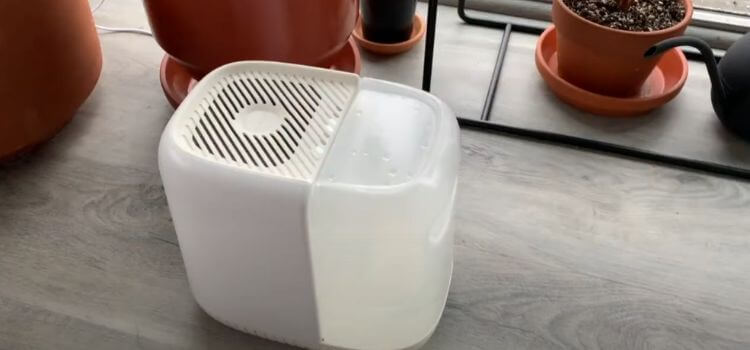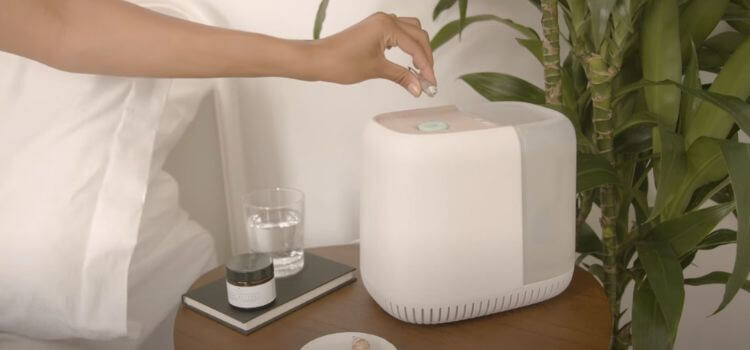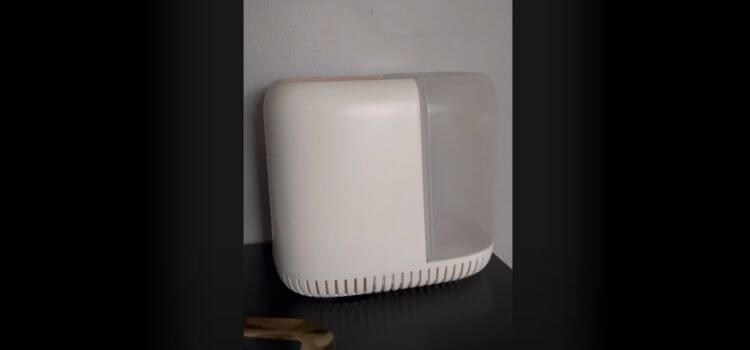As an Amazon Associate, I earn from qualifying purchases

A canopy humidifier can be worth it for those looking to increase humidity in a specific area, such as a bed or desk. It can provide targeted relief for dry skin, congestion, and other respiratory issues.
It’s appropriate because of its small size and quiet functioning, and it is for personal use in small spaces. If you’re considering investing in a canopy humidifier, it’s essential to weigh the benefits against your specific needs. While it may not be necessary for larger rooms or whole-house humidity control, it can be valuable to a personal space.
Recognizing its strengths and weaknesses can assist you in deciding whether a canopy humidifier is worth it.
Introduction To Canopy Humidifiers
Introduction to Canopy Humidifiers: Canopy humidifiers are innovative tools for efficiently increasing the moisture content of the air in your house. They provide a chic and practical way to counteract dry indoor air, which can result in various health issues and discomfort.
The Rise Of Canopy Humidifiers
Canopy humidifiers have gained popularity for their sleek design and functionality, providing a modern twist on traditional humidifiers. They are becoming a preferred choice for those looking to enhance their home environment with both practicality and aesthetics.
Critical Features Of Canopy Humidifiers
- Stylish Design: Canopy humidifiers come in various contemporary designs that complement contemporary home furnishings flawlessly.
- Efficient Humidification: These devices moisturize the air, creating a comfortable and healthier indoor environment.
- Quiet Operation: Canopy humidifiers operate silently, ensuring a peaceful atmosphere in your living spaces.
- Easy Maintenance: They are designed for hassle-free maintenance, making them convenient to use and clean.
- Customizable Settings: Many canopy humidifiers offer adjustable settings to suit individual preferences and room sizes.
Benefits Of Using A Canopy Humidifier

Discover the advantages of incorporating a canopy humidifier into your living space. From improving air quality to enhancing skin health, a canopy humidifier offers a range of benefits that can positively impact your well-being.
Improving Air Quality
A canopy humidifier helps maintain optimal moisture levels, reducing airborne allergens and environmental pollutants.
Health Advantages For Skin And Respiratory System
- Moisture from the humidifier hydrates skin, preventing dryness and irritation.
- Adequate humidity can ease respiratory issues like congestion and coughing.
- Enhanced air quality supports overall respiratory health and well-being.
Comparing Canopy To Traditional Humidifiers
Choosing the correct humidifier is crucial when maintaining optimal humidity levels in your home. Canopy humidifiers have gained popularity for their innovative design and efficient performance. However, how do they compare to traditional humidifiers? Let’s delve into the differences to help you make an informed decision.
Design And Usability Differences
Canopy humidifiers feature a sleek and modern design, often resembling a stylish home decor piece rather than a typical appliance. Their compact size and aesthetically pleasing appearance make them easy to integrate into any living space without being an eyesore. On the other hand, traditional humidifiers are often bulkier and may blend differently with your home’s interior design.
In terms of usability, Canopy humidifiers are designed for hassle-free maintenance. With features like easy-to-clean components and intuitive controls, they offer a user-friendly experience. Traditional humidifiers may require more frequent cleaning and upkeep, which can be difficult and time-consuming for users.
Performance And Efficiency
Regarding performance, Canopy humidifiers are known for their efficient and consistent mist output, ensuring optimal humidity levels in the room. The advanced technology in Canopy humidifiers enables them to deliver moisture effectively without excessive noise or energy consumption. Traditional humidifiers may vary in performance, with some models needing to be more efficient and energy-efficient.
Regarding efficiency, Canopy humidifiers are designed to use water more efficiently, resulting in longer operational times between refills. This can be very helpful for those who prefer a low-maintenance option. Traditional humidifiers may require frequent refills and consume more water, leading to higher operational costs in the long run.
Maintenance And Upkeep
Maintaining a canopy humidifier can be beneficial for your health and home. It helps to keep the air moist, reducing dryness in your skin and respiratory system. However, regular upkeep, such as cleaning and replacing filters, may increase costs.
Maintenance and upkeep are crucial to consider when investing in a canopy humidifier. The longevity, durability, and ease of washing contribute significantly to the total cost of the appliance. Let’s investigate these factors to understand if a canopy humidifier is worth the investment.
Ease Of Cleaning
Cleaning a canopy humidifier is essential for maintaining a healthy indoor environment. Due to its design, many models offer removable water tanks and detachable components, making it relatively easy to clean. Accessing and cleaning the water tank and misting the nozzles and filters ensures that mold and bacteria are kept at bay. This user-friendly maintenance feature simplifies the upkeep of the humidifier, promoting optimal functionality and hygienic operation.
Longevity And Durability
Canopy humidifiers are designed to withstand regular use and provide long-term benefits. High-quality materials ensure the appliance’s durability, reducing the need for frequent replacement. With proper care and maintenance, a well-built canopy humidifier can serve you for years, making it a reliable investment for maintaining a comfortable indoor environment. In conclusion, the maintenance and upkeep of a canopy humidifier are essential considerations when evaluating its worth. The ease of cleaning and the longevity and durability of the appliance contribute to its overall value, making it a viable choice for improving indoor air quality.
Cost Analysis

When considering the purchase of a canopy humidifier, it’s crucial to assess the cost implications. A thorough cost analysis can determine whether the initial investment and ongoing running costs align with your budget and energy efficiency goals.
Initial Investment
The initial investment for a canopy humidifier includes the cost of the unit itself, installation, and any additional accessories or maintenance tools. While prices vary, a quality canopy humidifier typically ranges from $200 to $500, contingent upon the brand and features. Installation costs may add an extra $50 to $200, based on how complicated the arrangement is. Investigating these upfront expenses is essential when budgeting for a canopy humidifier.
Running Costs And Energy Efficiency
When evaluating the running costs of a canopy humidifier, consider the energy consumption and maintenance requirements. Canopy humidifiers are generally more energy-efficient than traditional models, resulting in lower electricity bills over time. The running costs also encompass the price of water and any replacement filters or parts. Choosing a very energy-efficient model with low maintenance demands is advisable to minimize long-term expenses.
User Experiences And Reviews
When considering purchasing a canopy humidifier, exploring user experiences and reviews is crucial to gaining insight into its practicality and effectiveness. Real-life experiences can provide valuable information beyond product specifications and marketing claims. Let’s delve into the positive feedback and common criticisms shared by users of canopy humidifiers.
Positive Feedback
Users have reported significantly improved indoor air quality after using canopy humidifiers. Maintaining optimal humidity levels has been praised for alleviating respiratory issues and reducing discomfort associated with dry air. Many have highlighted the quiet operation of these humidifiers, making them ideal for bedrooms and office spaces. Users also value the sleek and contemporary style of canopy humidifiers seamlessly integrated into their living spaces.
Common Criticisms
A few individuals have voiced worries over the upkeep requirements of canopy humidifiers, particularly regarding cleaning and refilling. Additionally, a few individuals have noted that specific models may be prone to leaking or producing excessive noise over time. While these criticisms are not universal, they emphasize the significance of careful thought and investigation before investing in a canopy humidifier.
Potential Downsides
Considering the potential downsides of a canopy humidifier, it may require frequent maintenance and be bulky in smaller spaces. However, the benefits of improved air quality and comfort may outweigh these drawbacks for many users.
Issues With Mold And Bacteria
Canopy humidifiers can promote mold and bacteria growth due to moist environments.
Limitations In Functionality
Canopy humidifiers may have limited functionality compared to other types of humidifiers.
Final Verdict

Is It A Worthy Investment?
A canopy humidifier can be a valuable addition to your home, providing numerous benefits for your health and comfort.
- Improves air quality
- Reduces dryness
- Helps with allergies
Investing in a canopy humidifier is a wise choice, considering the positive impact on your well-being.
Alternatives To Consider
If you’re exploring other options, consider these alternatives:
- Ultrasonic humidifiers
- Evaporative humidifiers
- Steam vaporizers
Each alternative has its benefits and drawbacks, so choose the one that best suits your needs.
Frequently Asked Questions
Yes, a canopy humidifier effectively adds moisture to the air, improving indoor humidity levels. It helps alleviate dryness, enhances comfort, and may offer health benefits. Regular maintenance is crucial for optimal performance.
Yes, a canopy diffuser is better than a humidifier because it disperses essential oils for aromatherapy. It also adds moisture to the air, creating a relaxing environment for better sleep and well-being.
Yes, you can use tap water with a Canopy Humidifier if it is clean and impurities-free.
Clean your canopy humidifier at least once a week to prevent mold and bacteria buildup. However, if you use it frequently or notice a buildup of mineral deposits, clean it more often. Follow the manufacturer’s instructions for specific cleaning tips.
Conclusion
After considering the benefits of a canopy humidifier, it’s clear that the investment is worthwhile. Improved air quality, health benefits, and enhanced comfort make it valuable to any space. Emphasize the significance of careful thought and investigation before a canopy humidifier is a practical and effective solution.
As an Amazon Associate, I earn from qualifying purchases
Leave a Reply